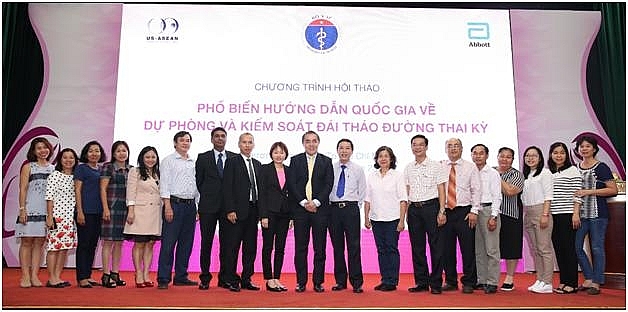Abbott in the good effort for Vietnamese people’s health
 |
| Douglas Kuo, general manager of Abbott Vietnam |
Could you please share more information about Abbott’s co-operation with the MoH on the “Prevention and management of GDM to contribute to the prevention and control of non-communicable diseases in Vietnam”?
Health is precious for all of us as individuals and as a community. Along with the government’s efforts, contributions from companies are needed to tackle national healthcare challenges. As a leading global supplier in healthcare with more than 130 years of heritage, our mission is to help people live their lives to the fullest through healthcare products and programmes all over the world.
Throughout its presence of 20 years in Vietnam, Abbott has been tirelessly showcasing its commitment towards improving Vietnamese living standards. We are proud to be an exemplary company with many initiatives that have contributed to the betterment of healthcare in Vietnam.
Not only providing a series of breakthroughs in the fields of diagnostics, healthcare equipment, nutrition, and pharmaceuticals, among others, Abbott has also struck partnerships to remove many bottlenecks in Vietnamese healthcare.
Gestational Diabetes Mellitus (GDM) is now reported to be rapidly increasing in Vietnam and all over the world. One in five pregnant women in Vietnam had GDM in 2017, which is obviously an alarming figure. Moreover, awareness among pregnant women and people in general is still restricted.
To help tackle the situation of GDM among Vietnamese pregnant women and to help prevent potential consequences, recently, Abbott and the MoH signed a memorandum of understanding (MOU) for the implementation of the project "Prevention and management of GDM to contribute to the prevention and control of non-communicable diseases in Vietnam" that aims to improve understanding and the systematic management of GDM. This is an additional step in a well-established and long-term strategic partnership between the MoH and Abbott in improving the quality of healthcare in Vietnam.
 |
| Douglas Kuo at the announcement event of National Guideline for GDM Prevention and Management |
Through what particular activities will Abbott collaborate with the MoH in this programme?
In February 2018, Abbott signed a MOU with the Ministry of Health for a strategic partnership on the project "Prevention and management of GDM to contribute to the prevention and control of non-communicable diseases in Viet Nam". In October 2018, the National Guideline for GDM Prevention and Management for short-term and long-term objectives has been built with the help of a lot of leading professors and doctors in maternity, gynaecology, endocrinology, and nutrition. At the end of this month, three symposiums have been organised in Hanoi, Ho Chi Minh City, and Danang for medical staff to publicise the National Guidelines on GDM Prevention and Management.
As the next steps, Abbott will work closely with the MoH to build a national curriculum and materials in GDM prevention and management, while at the same time providing diagnostics and training courses for HCP about GDM to change pregnant women’s lifestyles and balance diets for each and typically provide nutritional solutions with proven diagnostic evidence to control diabetes effectively. In the first year, there will be pilot screening and diagnostic implemented at 15 key hospitals, expecting to bring benefits to 75,000 people and help to reduce the incidence of GDM in Vietnam.
Although the programme is only in its initial stages, there has been overwhelming positive feedback. Through symposiums and seminars, the heads of health services and hospitals that are working with maternal and children’s healthcare have been updated with knowledge about GDM to draw up prevention and counselling plans for women who are of a child-bearing age to avoid GDM. This makes us more confident in this partnership with the MoH in fighting GDM and other threats to Vietnamese people’s health.
This is not the first collaboration between Abbott and the MoH. What previous programmes did you participate in and with what results?
In Vietnam, during recent years, Abbott was honoured to join hands with the MoH to solve healthcare issues on a national scale through many important programmes such as maternal health, clinical health, and food safety, to mention only a few. These programmes have been well-recognised by health experts and were of great benefit to them and Vietnamese people.
Specifically, in 2016, Abbott supported the MoH to build “Clinical nutrition improvements in hospitals.” This project was part of the National Strategy of Vietnamese Nutrition, focusing on developing a quality improvement programme (QIP) for clinical nutrition in hospitals. Up till now, QIP has been made available in seven big hospitals nationwide, bringing practical benefits to patients.
Besides, to fight malnutrition in rural communities to improve the nutritional health of children in rural areas of Vietnam, the Abbott Fund is partnering with AmeriCares to support the Giao Diem Humanitarian Foundation Pediatric Nutritional Program. Since the programme began in 2004, the partnership has supported more than 25,000 children, and the prevalence of malnutrition among participating children has dropped below the UN Millennium Goals to approximately 20 per cent.
In total, Abbott and the Abbott Fund have provided more than VND230 billion ($10 million) in grants and product donations in Vietnam to help people build better lives and a healthier community.
What the stars mean:
★ Poor ★ ★ Promising ★★★ Good ★★★★ Very good ★★★★★ Exceptional
Related Contents
Latest News
More News
- PM outlines new tasks for healthcare sector (February 25, 2026 | 16:00)
- Ho Chi Minh City launches plan for innovation and digital transformation (February 25, 2026 | 09:00)
- Vietnam sets ambitious dairy growth targets (February 24, 2026 | 18:00)
- Masan Consumer names new deputy CEO to drive foods and beverages growth (February 23, 2026 | 20:52)
- Myriad risks ahead, but ones Vietnam can confront (February 20, 2026 | 15:02)
- Vietnam making the leap into AI and semiconductors (February 20, 2026 | 09:37)
- Funding must be activated for semiconductor success (February 20, 2026 | 09:20)
- Resilience as new benchmark for smarter infrastructure (February 19, 2026 | 20:35)
- A golden time to shine within ASEAN (February 19, 2026 | 20:22)
- Vietnam’s pivotal year for advancing sustainability (February 19, 2026 | 08:44)

 Tag:
Tag:
























 Mobile Version
Mobile Version